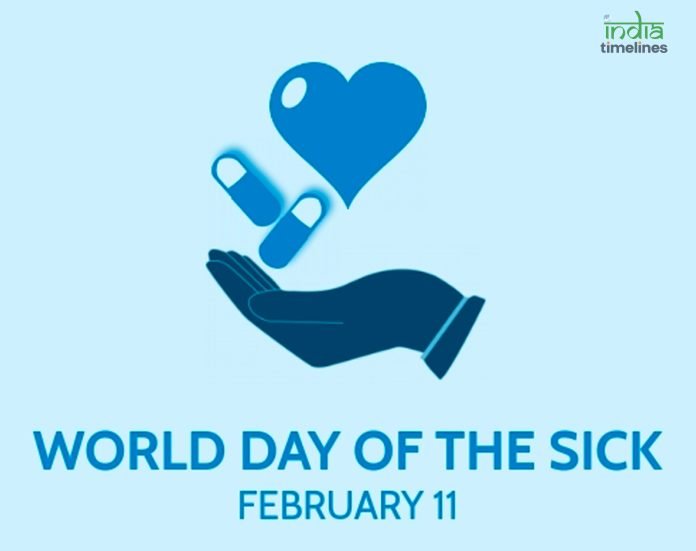
The World Day of the Sick, an annual observance held on February 11th, serves as a poignant reminder of the global significance of healthcare and the imperative of compassion towards those grappling with illness and suffering. This day holds particular importance in the hearts and minds of healthcare professionals, caregivers, and communities worldwide, as it underscores the inherent dignity of every individual, especially during times of vulnerability.
Originating from a papal initiative by Pope John Paul II in 1992, the World Day of the Sick was established to coincide with the Feast of Our Lady of Lourdes, a significant event in the Catholic faith associated with healing and miraculous interventions. However, over the years, its observance has transcended religious boundaries to become a universal call for empathy and support for the sick and infirm.
The commemoration of this day is not merely symbolic; it serves as a catalyst for action, prompting individuals, organizations, and governments to reevaluate and strengthen their commitment to healthcare accessibility, quality, and affordability. It prompts reflection on the disparities that exist in healthcare access globally and encourages collaborative efforts to address them.
Moreover, the World Day of the Sick is a testament to the tireless dedication and selflessness of healthcare professionals and caregivers who tirelessly serve the sick and vulnerable, often at great personal sacrifice. It is an opportunity to express gratitude for their unwavering commitment and to recognize their invaluable contributions to society.
Beyond its immediate focus on healthcare, this observance also fosters a broader conversation about the importance of empathy, kindness, and solidarity in navigating the complexities of human suffering. It reminds us that compassion is not merely a virtue but a fundamental aspect of our humanity, essential for fostering a more inclusive and supportive society.
Particularly in the wake of global health crises, such as the COVID-19 pandemic, the significance of the World Day of the Sick has been amplified. It has brought into sharp focus the fragility of health systems, the resilience of communities, and the imperative of collective action in addressing public health challenges. It serves as a sobering reminder of the interconnectedness of human health on a global scale and the urgency of prioritizing health equity and resilience.
In essence, the World Day of the Sick transcends its designation as a single day of observance; it embodies a timeless message of compassion, solidarity, and resilience in the face of adversity. It calls upon individuals and societies to uphold the inherent dignity of every person, regardless of their health status, and to work towards a world where healthcare is not just a privilege but a universal human right.
History of World Day of the Sick
The World Day of the Sick, instituted by Pope John Paul II in 1992, holds profound significance in fostering a culture of empathy and support for the sick and vulnerable across the globe. Rooted in the compassionate teachings of Christianity, this day serves as a poignant reminder of our collective responsibility to care for those who are suffering and in need.
Pope John Paul II, known for his deep empathy and commitment to social justice, envisioned this day as a platform to promote solidarity and compassion within society. By designating a specific day dedicated to honoring the sick, he aimed to raise awareness about the challenges they face and encourage greater support and understanding from communities worldwide.
The establishment of the World Day of the Sick within the Catholic Church underscores the spiritual imperative of caring for the sick, drawing inspiration from the teachings of Jesus Christ, who showed unwavering compassion towards the afflicted. It serves as a call to action for individuals and institutions to emulate this ethos of compassion and service in their interactions with the sick and marginalized.
Over the years, the World Day of the Sick has evolved into a global observance, transcending religious boundaries to become a symbol of solidarity and empathy for all those facing illness and adversity. It serves as a reminder of the inherent dignity and worth of every human being, irrespective of their health status, and emphasizes the importance of providing holistic care that addresses not only physical ailments but also emotional, social, and spiritual needs.
On this day, various initiatives and activities are organized around the world to raise awareness about healthcare issues, promote access to healthcare services, and express support for individuals and families affected by illness. From medical missions and free health screenings to prayer services and community outreach programs, the World Day of the Sick inspires diverse efforts aimed at alleviating suffering and fostering healing and hope.
In addition to its practical impact, the World Day of the Sick also serves as a catalyst for dialogue and collaboration among healthcare professionals, policymakers, religious leaders, and civil society organizations. By bringing together diverse stakeholders, it creates opportunities for sharing best practices, advocating for policy reforms, and building partnerships to address systemic barriers to healthcare access and quality.
As we commemorate the World Day of the Sick, let us reaffirm our commitment to upholding the principles of solidarity, compassion, and justice in our interactions with the sick and vulnerable. May this day serve as a reminder of our shared humanity and our collective responsibility to care for one another, especially in times of sickness and adversity.
Theme of World Day of the Sick 2024
The theme for World Day of the Sick 2024, “Healing the World Together,” underscores a poignant call to action, uniting individuals, communities, and nations in a shared endeavor to prioritize and promote health and well-being worldwide. In an era marked by unprecedented global health challenges, this theme serves as a beacon of hope, urging collaboration, compassion, and collective responsibility in navigating the complexities of illness, healing, and resilience.
Amidst the backdrop of a rapidly evolving healthcare landscape, characterized by emerging infectious diseases, chronic conditions, and disparities in access to care, “Healing the World Together” resonates deeply. It speaks to the interconnectedness of our human experience, transcending geographical boundaries and cultural divides. It acknowledges that the health of any individual or community is inextricably linked to the health of the entire planet.
At its core, this theme recognizes that healing is not solely the domain of healthcare professionals or policymakers but is a shared endeavor that requires the active participation and engagement of all members of society. Whether through advocating for equitable healthcare systems, promoting preventive measures, or supporting those affected by illness, each individual has a role to play in shaping a healthier, more resilient world.
“Healing the World Together” also highlights the power of solidarity and collaboration in addressing complex health challenges. It calls upon governments, organizations, and individuals to work together across sectors and disciplines, pooling resources, expertise, and innovation to overcome barriers to health and well-being. By fostering partnerships and fostering dialogue, we can amplify our collective impact and drive meaningful change on a global scale.
Moreover, this theme underscores the importance of addressing the social determinants of health, recognizing that factors such as poverty, inequality, and discrimination have profound implications for individual and community well-being. By addressing these underlying drivers of ill health and inequity, we can create a more just and inclusive society where everyone has the opportunity to thrive.
As we observe World Day of the Sick 2024, let us heed the call to action embodied in the theme “Healing the World Together.” Let us reaffirm our commitment to promoting health, supporting those in need, and building a future where every individual can enjoy the highest attainable standard of physical, mental, and social well-being. In doing so, we can lay the foundation for a healthier, more resilient world for generations to come.
Significance of World Day of the Sick
World Day of the Sick is an annual observance that carries profound significance in its recognition of the challenges faced by individuals battling illness, as well as in honoring the dedicated caregivers and healthcare professionals who tirelessly support them. Established by Pope John Paul II in 1992, this day falls on February 11th, coinciding with the commemoration of Our Lady of Lourdes, a site historically associated with miraculous healings.
At its core, World Day of the Sick serves as a poignant reminder of the inherent vulnerability of the human condition and the universal need for compassion and solidarity in times of sickness. It underscores the importance of empathy and support, not only in alleviating physical suffering but also in providing comfort and emotional solace to those grappling with illness and adversity.
Beyond its symbolic significance, this observance also serves as a catalyst for advocacy and action, shedding light on pressing health issues and advocating for improved access to healthcare services for all individuals, regardless of their socio-economic background or geographical location. It emphasizes the importance of equitable healthcare systems that prioritize the well-being of every individual and strive to address the underlying determinants of health disparities.
Moreover, World Day of the Sick provides an opportunity for communities to come together in solidarity, fostering a sense of collective responsibility in addressing health challenges and promoting holistic approaches to wellness. It encourages dialogue and collaboration among stakeholders, including governments, healthcare institutions, non-governmental organizations, and civil society, to develop innovative solutions and policies that promote health equity and social justice.
In addition to its spiritual and humanitarian dimensions, this observance also serves as a platform for raising awareness about specific health issues and promoting preventive measures and healthy lifestyles. From raising awareness about chronic illnesses such as cancer, diabetes, and cardiovascular diseases to highlighting the importance of mental health and well-being, World Day of the Sick amplifies the voices of those affected by illness and empowers communities to take proactive steps towards healthier futures.
Ultimately, World Day of the Sick encapsulates the essence of solidarity, compassion, and resilience in the face of adversity. It reminds us of our shared humanity and the interconnectedness of our experiences, inspiring us to uphold the dignity and rights of every individual, particularly those most vulnerable to illness and suffering. As we commemorate this day, let us reaffirm our commitment to building a world where health is a universal right and where no one is left behind in the journey towards healing and wholeness.
Activities and Events
On World Day of the Sick, various activities and events are organized around the world to commemorate the day. These may include prayer services, medical camps, seminars on health-related topics, and initiatives aimed at supporting those in need.
Quotes for World Day of the Sick
“The greatest healing therapy is friendship and love.” – Hubert H. Humphrey
“The art of healing comes from nature, not from the physician.” – Paracelsus
“Health is a state of complete harmony of the body, mind, and spirit.” – B.K.S. Iyengar
Celebrations Around the World
Different countries celebrate World Day of the Sick in their unique ways, often incorporating cultural traditions and practices. From special prayers to community outreach programs, the day is marked with compassion and solidarity across the globe.
Supporting Organizations
Numerous organizations, both religious and secular, play a vital role in supporting the sick and promoting health initiatives. These organizations provide essential services, advocacy, and resources to individuals and communities in need.
Role of Technology in Healthcare
Advancements in technology have revolutionized the healthcare industry, making diagnosis and treatment more accessible and efficient. From telemedicine to wearable devices, technology continues to improve patient care and outcomes.
Challenges Faced by the Sick
Despite progress in healthcare, individuals facing illness still encounter various challenges, including financial burdens, stigma, and limited access to quality care. Addressing these challenges requires collective action and advocacy.
Promoting Compassion and Empathy
In a world often marked by division and conflict, promoting compassion and empathy towards the sick is more important than ever. Small acts of kindness and understanding can make a significant difference in the lives of those struggling with illness.
Global Health Initiatives
Global health initiatives aim to address pressing health issues on a global scale, including infectious diseases, maternal and child health, and non-communicable diseases. Collaboration between governments, NGOs, and the private sector is essential for achieving meaningful progress.
Reflection and Meditation
Taking time to reflect on one’s health and well-being is essential for maintaining balance and perspective. Practices such as meditation and mindfulness can help individuals cope with illness and navigate the challenges they may face.
Spreading Awareness
Raising awareness about health issues is crucial for promoting preventive measures and early intervention. Social media platforms and other communication channels play a vital role in disseminating information and engaging communities in meaningful dialogue.
Conclusion
As we commemorate World Day of the Sick 2024, let us reaffirm our commitment to promoting health and supporting those in need. By working together, we can create a world where access to quality healthcare is a reality for all, and compassion is at the heart of our interactions.
FAQs
- What is the origin of World Day of the Sick?
World Day of the Sick was established by Pope John Paul II in 1992 to promote a culture of care and compassion towards the sick.
2. How is World Day of the Sick celebrated?
The day is celebrated with various activities and events, including prayer services, medical camps, and seminars on health-related topics.
3. What is the significance of the theme “Healing the World Together” for 2024?
The theme emphasizes the collective responsibility we all share in promoting health and well-being, especially in the face of ongoing global health challenges.
4. How can individuals show support for World Day of the Sick?
Individuals can show support by volunteering at medical camps, offering assistance to those in need, and raising awareness about health issues.
5. What role does technology play in healthcare on World Day of the Sick?
Technology plays a significant role in improving patient care and access to healthcare services, especially in remote or underserved areas.



































